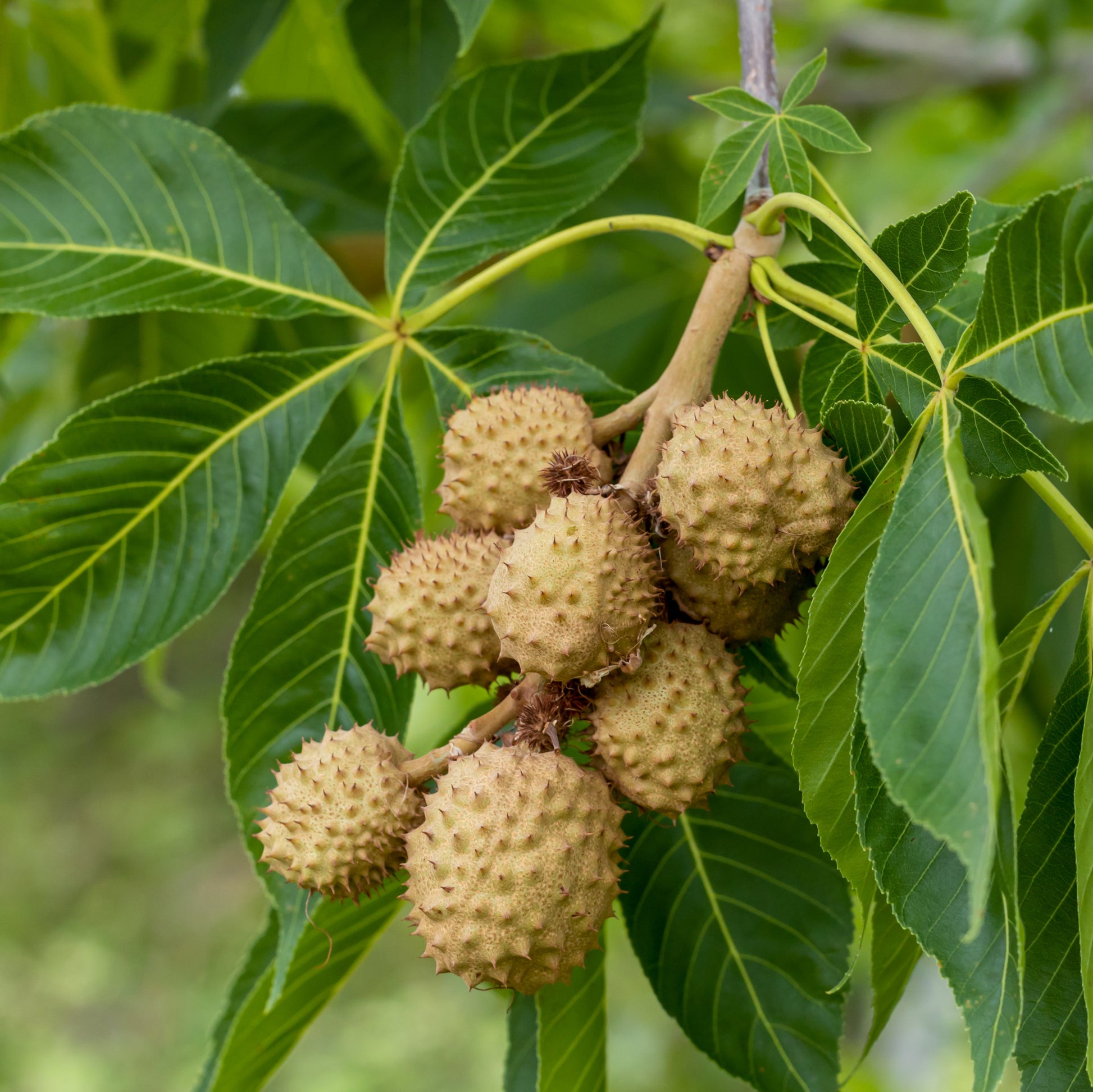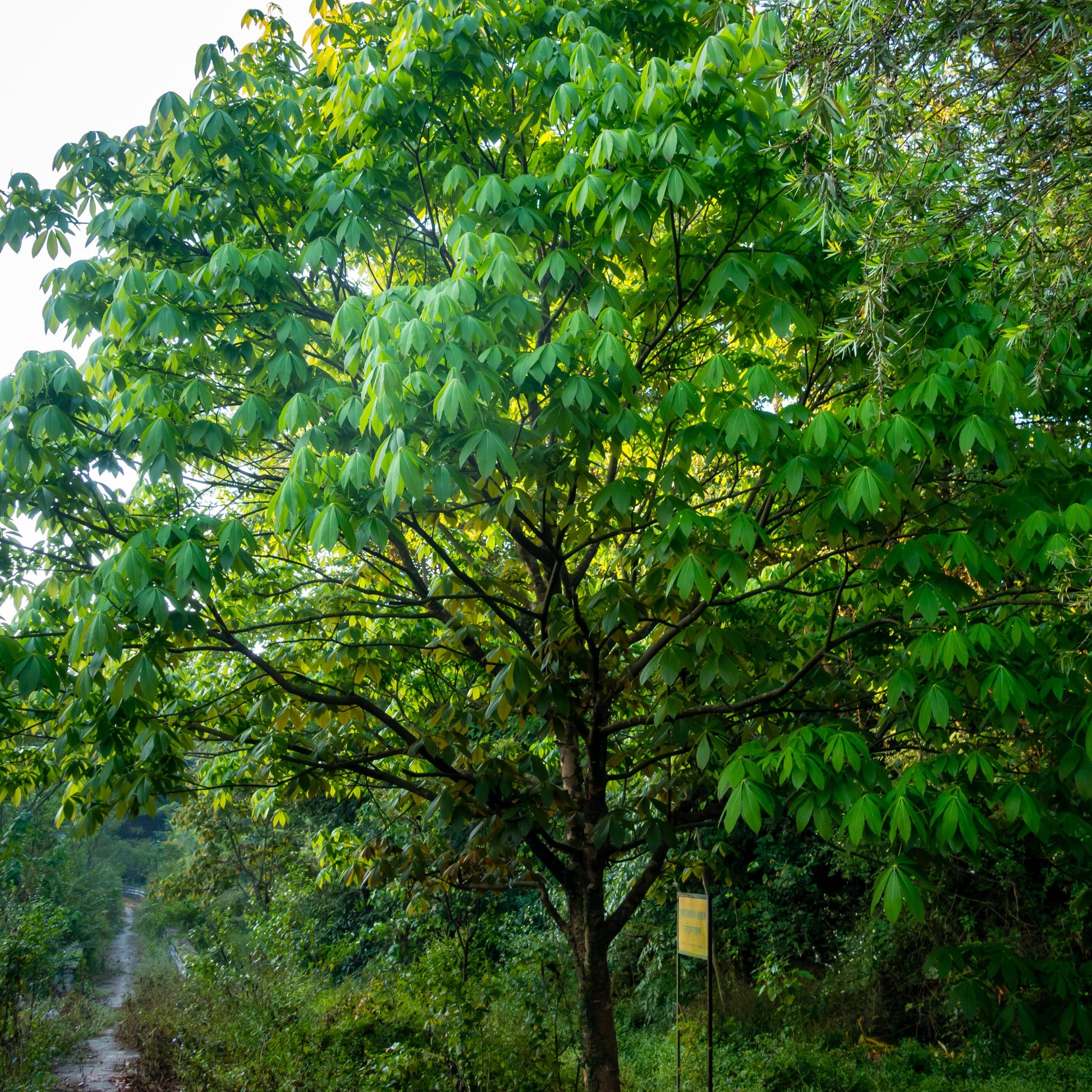Limited Quantities - Reserve Now For Fall
Ohio Buckeye Tree
Ohio Buckeye Tree
Couldn't load pickup availability
Aesculus glabra
Ohio Buckeye
The Ohio Buckeye is a unique, native deciduous tree known for its distinctive palm-shaped leaves, showy spring flowers, and glossy brown nuts (“buckeyes”). This bare root variety is deeply rooted in Midwestern heritage and offers exceptional seasonal interest—from yellow-green spring blooms to rich fall foliage and iconic seed pods.
Compact, shade-tolerant, and wildlife-friendly, the Ohio Buckeye is ideal for woodland edges, pollinator gardens, and naturalized landscapes where native diversity and bold form are appreciated.
Ohio Buckeye
| Attribute | Details |
|---|---|
| 🌱 Variety | Aesculus glabra |
| 🌿 Botanical Name | Aesculus glabra |
| 🏷️ Common Names | Ohio Buckeye, American Buckeye |
| 🌳 Mature Height | 20–40 feet |
| 🌐 Mature Width | 20–30 feet |
| 📈 Growth Rate | Moderate (1–2 feet per year) |
| ⏳ Lifespan | 70–100+ years |
| 🧊 USDA Zones | 3–7 |
| ☀️ Sun Preference | Full sun to partial shade (tolerates woodland edge light) |
| 🧱 Soil Type | Moist, well-drained loam or clay soils |
| ⚖️ Soil pH | Slightly acidic to neutral (5.5–7.0) |
| 💧 Water Needs | Moderate; prefers consistent moisture |
| 🍃 Foliage Color | Deep green in summer; yellow to orange in fall |
| 🌸 Flower/Berry Production | Upright yellow-green flower clusters; brown buckeye nuts |
| 🐝 Wildlife Attraction | Bees, butterflies, squirrels, birds |
| 🌿 Growth Habit | Rounded, dense, multi-branched canopy |
| 🌸 Self-Pollinating? | Yes |
| ↔️ Spacing | 20–30 ft apart for shade or specimen planting |
| 🏡 Landscape Uses | Native gardens, shade trees, wildlife plantings |
| 🧹 Maintenance Level | Moderate |
Environmental Benefits
🌼 Supports early-season pollinators with nectar-rich spring flowers
🐦 Produces nuts for wildlife like squirrels and native birds
🌿 Thrives in native restoration and understory plantings
🌎 Aids in soil stabilization and biodiversity enhancement
Pros & Cons
| ✅ Pros | ⚠️ Cons |
|---|---|
| 🌰 Distinctive native tree with cultural and ecological value | ⚠️ All parts (including nuts) are toxic if ingested by humans/livestock |
| 🌸 Pollinator-friendly blooms attract bees and butterflies | 🍁 Leaf drop may begin earlier than other shade trees |
| 🐿️ Wildlife enjoy buckeye nuts in fall | 🪵 Weak wood structure may break in strong storms |
| 🌿 Adaptable to sun or partial shade conditions | 🌱 Transplants best when young; larger trees can be sensitive |
| 🧬 Native to the Midwest and highly drought tolerant | 🧹 Fruit and leaf drop may create seasonal cleanup needs |
Planting & Care Guide
🛁 Soak roots for 6–12 hours before planting
🕳️ Dig a hole twice the width of the root system; keep crown level with soil
🌾 Add mulch (2–3 inches) to conserve moisture and insulate roots
💦 Water deeply and regularly during the first growing season
✂️ Prune in winter to remove dead limbs and encourage open shape
🧪 Fertilize lightly in early spring if soil is nutrient-deficient
The Ohio Buckeye is a hardy, heritage-rich native tree that offers spring flowers, fall color, and signature buckeye seed pods—all wrapped in a compact, adaptable form. Whether you’re building out a native woodland, adding depth to your pollinator garden, or celebrating state pride, this tree brings beauty, biodiversity, and Buckeye charm to any landscape.
Share




